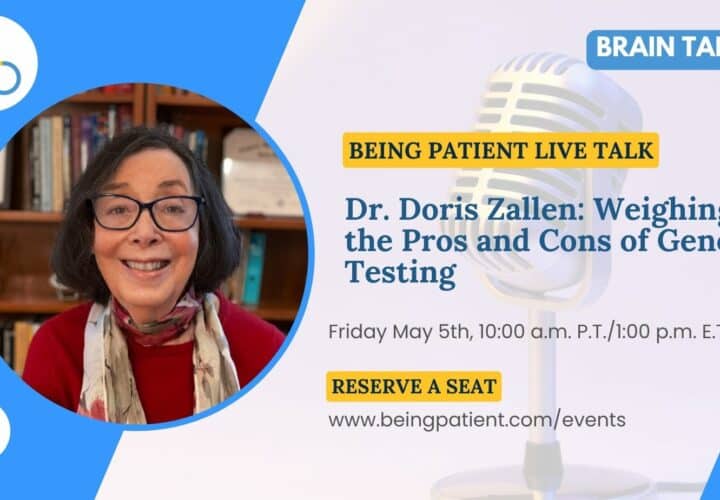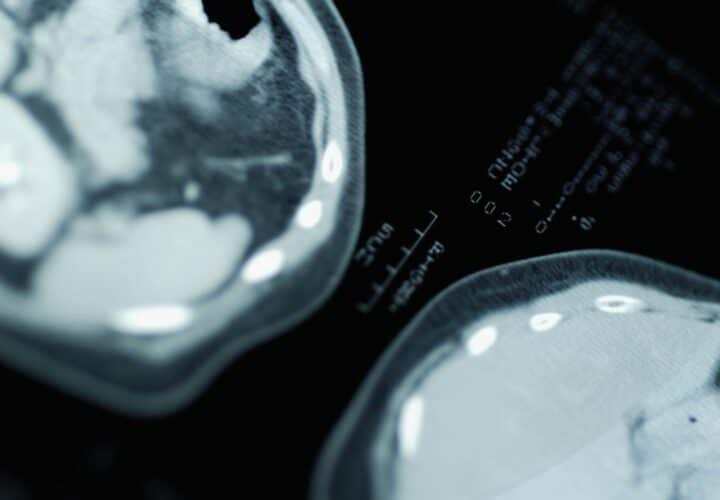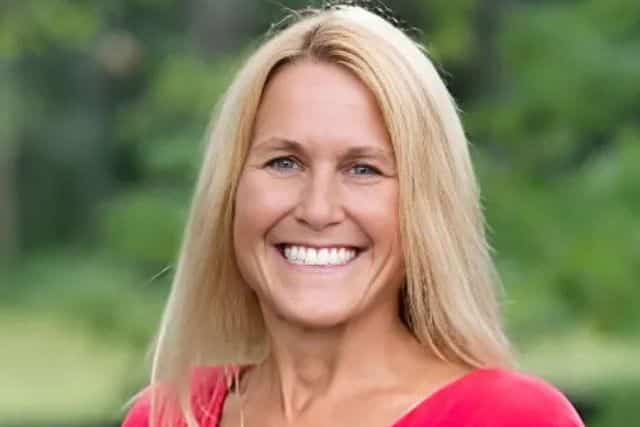Virginia Tech’s Dr. Doris Zallen, the author of the book To Test or Not to Test, shares her insights on how people should decide whether to get testing for "the Alzheimer's gene," APOE4.
Everyone carries two copies of a certain gene called APOE4, and it comes in a few variants. One of these variants, APOE4, has been found to, in some populations, increase a person’s chances of developing health conditions including Alzheimer’s disease: While 10 to 15 percent of the general population will have developed Alzheimer disease by age 85, for those with one copy of the APOE4 gene mutation, that risk ranges from 25 to 40 percent. For those with two copies, it is higher: 40 to 55 percent.
This bump in risk has earning it the nickname “the Alzheimer’s gene.” Because APOE4, can be passed down from generation to generation, many people with dementia in their families are grappling with a big question: Should they get genetic testing to find out if they carry this Alzheimer’s risk gene?
To help our community tackle the question, Being Patient invited genetic testing expert Dr. Doris Zallen of Virginia Tech to talk about genetic testing for Alzheimer’s — and what people should be asking themselves as they’re considering genetic testing.
Zallen is not a genetic counselor, but she has explored the issue with great depth, and she has created a number of resources to help people better understand their options when it comes to genetic testing. In her role as Virginia Tech’s Professor Emerita of Science Studies and Humanities, Zallen researches bioethics with an emphasis on genomic medicine. She is the author of two books on genetic testing, including To Test or Not to Test: A Guide to Genetic Screening and Risk, in which she draws from the experiences of individuals interviewed facing genetic issues themselves or in their families.
READ MORE:
Being Patient readers with ApoE4
share fears, plans, and inspiration
She also led a team that created an online educational tool to help people make decisions about whether or not to have genetic testing for the APOE4 gene. The four-question framework her team laid out supplements genetic counseling by carefully helping people weigh their options.
Keeping that four-question framework in mind, Being Patient EIC Deborah Kan led a discussion with Zallen on the pros and cons of genetic testing, and what people should keep in mind. Watch the full talk below, or scroll down for a transcript of the conversation.
Being Patient: The world we live in today is incredibly different regarding how much information is at our fingertips. When launching Being Patient, I got four or five companies to run my genetic testing to see how the forms presented information. I was astounded that some pretty serious information on disease status is going to people who may not fully understand the implications. Let’s start there— should people really want to have this information?
Dr. Doris Zallen: When I started out, I was not a bioethicist; I was a research scientist working at the lab bench and developing genetic tests. This was in the early days of genetic testing, and I got to meet real people, not just DNA samples or whatever. What surprised me was that some people wanted their genetic information for whatever disorder I was working on, but other people really didn’t. I was very perplexed by this, and over time, actually, the questions of “what’s genetic testing about, who should have it, and why would people want it or not want it?” became central to me.
To answer that, or to at least try to answer it, I did interviews with genetic counselors and genetic professionals, of course, but I also wanted the real-world experience of people who had considered genetic testing. This included people who considered it and had it and people who thought about it and didn’t have it. There are many reasons to have genetic testing and to get that genetic information about yourself, but there are many reasons not to. In the books that I wrote about genetic testing. The main point I learned from these people on the front lines, the professionals, and the people with real-world experience is that preparation is important. You have to think about it and decide whether going ahead with it is right for you.
“There are many reasons to have
genetic testing… but there are
many reasons not to.”
Being Patient: Right. With at-home genetic tests, there are people who had no idea they had a genetic link to Alzheimer’s but found out through their results. So, do you think it’s necessary to educate people on what they may find out before they actually find out with these tests?
Zallen: Absolutely. The main thing I’ve learned and tried to transmit in my work is that preparation is key. You have to think about whether the testing is right for you. This is what I’ve learned from the people I interviewed; there were over 350 of them, so I got a pretty good range of experience. I learned that there are several different areas you really have to consider as part of your preparation as part of thinking about it.
The first is, do you have a family history? Is there some reason that you might be at higher risk? Because people with a family history of Alzheimer’s do have an increased risk. What’s your family history? Do you have a reason to be concerned? The second is, will the information you get from the tests be of value to you? Now, for tests for Alzheimer’s risk, the ApoE4 test is what I’m talking about. You don’t get a yes or no answer. You don’t get an answer, “Oh, yes, you will develop the disorder,” or “No, you won’t.” You get a risk, a probability, and that probability changes over time.
The third thing people should say is what I’ve learned that they should think about is the timing, right? Because genetic testing and finding out this information comes with anxiety and stress. It’s probably not a good time to have genetic testing if you have other concerns or pressures in your life. For example, if you’re moving, have job issues, or have a sick relative. So, is the timing right? And the last is, do the benefits of getting this information outweigh some of the burdens that the information can bring?
Being Patient: Did you find that more people really want to know about their genetics, or did most people not? What insights did you take away?
Zallen: It’s hard to measure that. I think people are interested, almost everyone is interested, and we talk about genes all the time. Genetic testing has become, you know, so commonly used not only in research but also independently of the medical community through online, do-it-yourself genetic testing companies that offer their services. When it comes to genetic testing, I think many people proceed with it and then regret it because they have unanticipated effects. There are effects not only on the person being tested but on their relatives, their siblings, their parents, and their children. So, there’s this added dimension of genetics that people discover.
Also, the reason many people may go outside the medical community is that they don’t want their genetic information misused, right? They don’t want it to be used, especially by insurance companies or by employers. So, there are all these concerns, and that’s why it’s really important to think about this ahead of time. So you’re prepared, instead of having testing, getting a result, and then fretting over some of the issues you hadn’t thought about.
Being Patient: You led a team that developed an online tool for people considering genetic testing for ApoE4. Could you tell us more about that?
Zallen: We had all this collective wisdom from people who had gotten genetic testing, which I collected in my book. I thought we’d have to make it more widely available because people are going outside the medical community online on their own to get genetic testing. So, we drew from those findings, the book, and the fact that you must know your family history. Also, the timing is important because you have to know what the test actually provides, and you have to weigh the advantages and the disadvantages. We created a tool, an educational tool, a decision aid that could be made available online for people as they started thinking about genetic testing.
Now, while we were doing this, we consulted with focus groups. We wanted a lot of input from people themselves who are thinking about genetic testing. And after we had the first draft, we tested it. Twelve hundred people looked at it and gave us feedback, and 93 percent of them found it helpful or very helpful and would recommend it to others. Some of the seven percent who didn’t find it helpful said that they already knew the information. In addition, they gave us very helpful feedback on improving this online tool, and we made the changes they suggested.
Being Patient: What were some of these recommendations?
Zallen: They wanted many different learning styles to be addressed by the tool. So, there are people who wanted lots of detail and lots of texts, and for them, we gave links to more detailed information, but we didn’t confront them with a whole lot of material as they went to the site. There were visual learners who wanted the statistical information and the probabilities to be presented in a visual way. There were auditory learners who wanted to hear things, so we had video vignettes. We used actors, but they used the real words of people from my interviews.
So, they wanted different learning styles to be addressed. They wanted it clear, they wanted it simple, and they wanted the pros and cons, the benefits and burdens to be presented in a balanced way. They didn’t want to feel that they were being encouraged to go one way or another.
Indeed, the tool has no position. It wants people to consider genetic testing in an informed way and make the best decisions for themselves at this time.
“The tool has no position. It just wants
people to consider genetic testing
in an informed way”
Being Patient: Regarding clinical trial participation, how do you handle knowledge regarding genetic testing? Especially with studies seeking out people that may have a family history or genetic testing, how do you express what you want to know and what you don’t want to know?
Zallen: For many studies, obviously, they want people at the highest risk, so they can best test any preventions or cures. You have to really do the thinking ahead of time to see if you are willing to accept the fact that the testing may find that you are at higher risk, that it will allow you entry into the trial.
But it may also bring some of the burdens that we’ve discussed that there could be family issues, or you could personally be very adversely affected by it. Some people told me it was like a cloud over their heads. Every day when they got up, every time they forgot where they put the car keys, you know, they thought this is the day. You really have to think about what suits you and what is best for you before you enter a trial.
If you are entering a trial, and then you get the information during the trial, if that genetic information is developed, you should be again offered the opportunity to learn or not learn any genetic information about yourself that was developed during a trial.
Being Patient: We’ve talked about a kind of caution around testing or the cons to consider. What would you say are the pros of genetic testing?
Zallen: Well, you have to think of this as three levels. At the personal level, the pros are if you find out you’re at higher risk, you could start taking steps, and you could not postpone moments. Many people said they didn’t want to postpone things like trips or experiences until their retirement, so they did it sooner. They made financial and healthcare arrangements for themselves. They kept up to date on new findings and advances that would pertain to them.
At the family level, some of the pros are, well, genes are shared with the family so that you can alert others in the family. If you have inherited one or two copies of the ApoE4 gene, they may also have inherited it. Maybe they can use that information to advance their own health and, you know, be better off for having the information. Then there’s the extra advantage, the social level, in that you can participate in research and help advance the field.
Katy Koop is a writer and theater artist based in Raleigh, NC.




